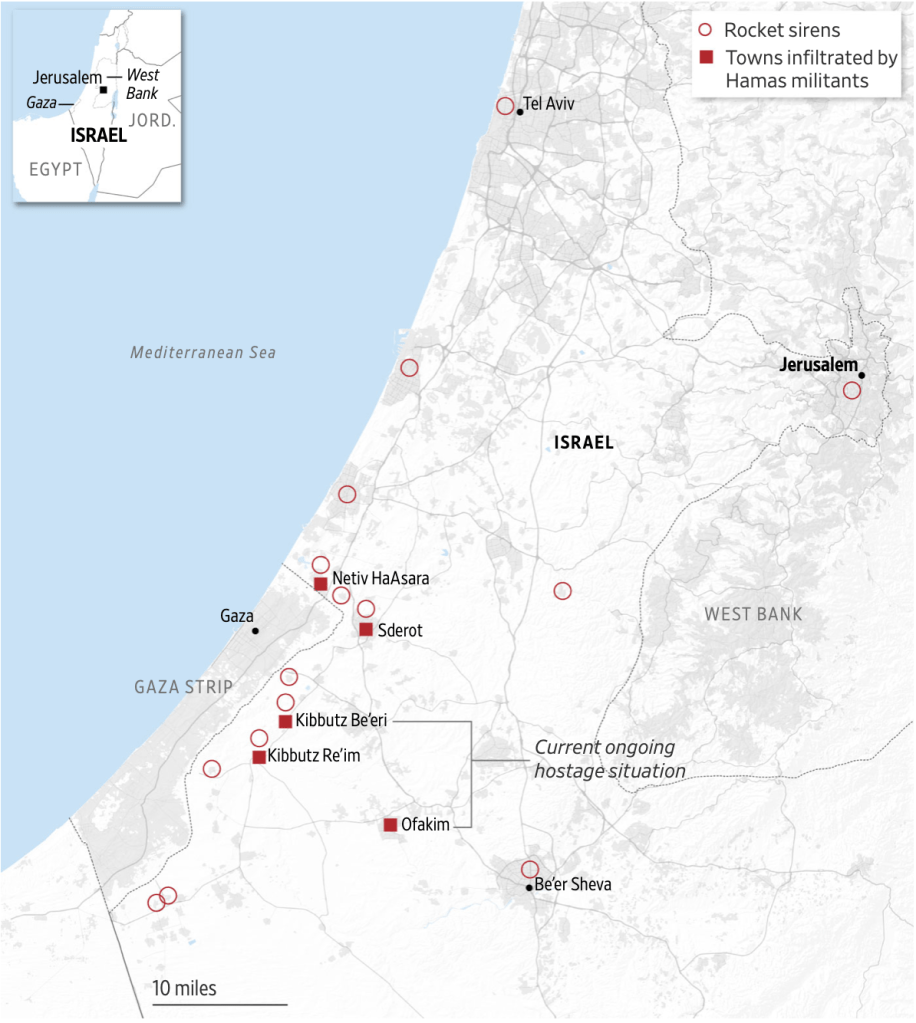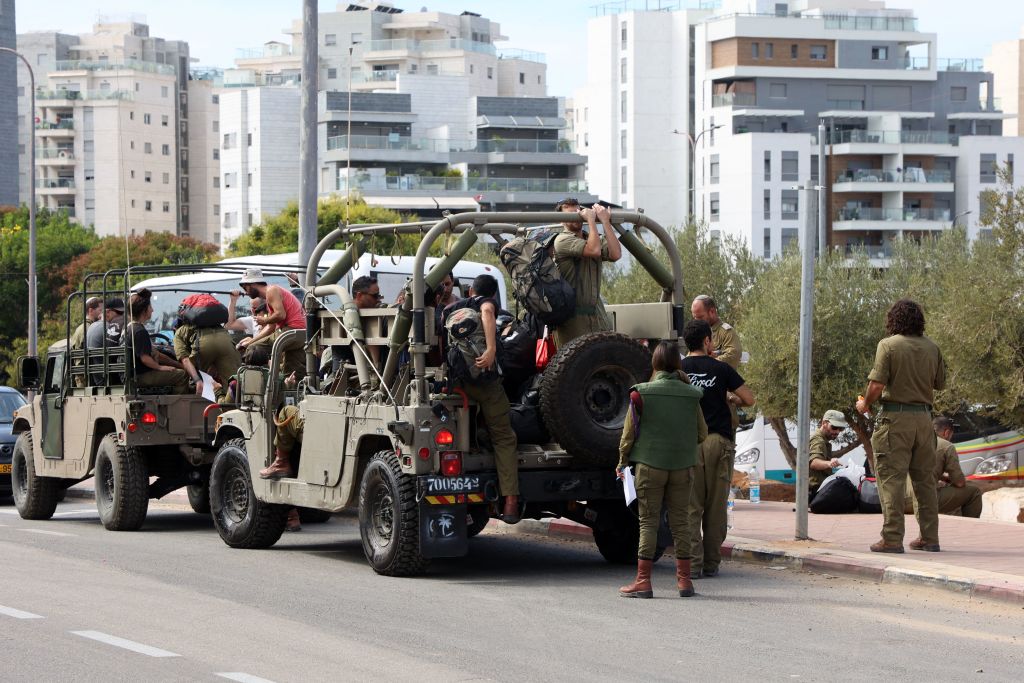Some 5,000 rockets have rained down on Israeli civilians in an attack co-ordinated from land, sea and air by Gaza-based Hamas and Palestinian Islamic Jihad. Gunmen have stormed the south of Israel, taking control of a number of towns. The attack seems to have taken Israeli intelligence completely by surprise: the death toll – 300 so far – is certain to rise with 900 injured and 100 kidnapped. ‘We are at war, not in an operation, not in rounds of fighting. At war,’ Benjamin Netanyahu has said. ‘I instructed a wide-scale call for reserves to respond militarily at an intensity and scale that the enemy has not known before. The enemy will pay a price they have never paid before.’ The Palestinian Health Ministry says 232 Palestinians have been killed so far, with more than 1,700 injured.
For now, Israel has to repulse the enemy, re-establish its security perimeter, bury its dead — then strike back.
No one predicted this. There were no simmering tensions, no exchanges of fire, none of the telltale signs of a coming salvo. Today’s events are being compared to the Yom Kippur War, which saw a coalition of Arab and Muslim nations launch a surprise assault on the holiest day in Judaism. Today is Simchat Torah, when Jews celebrate their ancestors receiving the laws from God. The yom tov will forever be associated with what may come to be known as the Simchat Torah War.
The political and public opprobrium heading the way of the Israel Defence Forces (IDF) and the Mossad will be coruscating but that is a matter for later. For now, Israel has to repulse the enemy, re-establish its security perimeter, bury its dead — then strike back. Netanyahu has called up reservists and promised to extract a heavy price for today’s attacks. For now, the international community is scolding Hamas but that will change when Israeli reprisals begin, at which point the US State Department, the EU, the UK Foreign Office and the rest will urge Israel to show ‘restraint’ and ‘proportionality’. A UN resolution mildly rebuking Hamas while furiously denouncing Israeli ‘aggression’ won’t be far behind.
Hamas has asked all Arabs and West Bank Palestinians to take up arms. ‘This is your day to make the enemy understand that his time has ended,’ said Mohammed Deif, who runs the military wing of Hamas. ‘Everyone who has a gun should take it out. The time has come.’
Delusions are dying in the desert today. There is the delusion that Hamas and Palestine Islamic Jihad (PIJ) can be ‘contained’ in Gaza in the long term. It’s a belief that runs the political spectrum in Israel, with the country’s governing elites having convinced themselves that the disengagement was painful but wise and necessary. In fact, Ariel Sharon’s withdrawal is in part to blame for what has happened. It gave the terrorists room to breathe and a platform from which to launch its offensives against Israelis.

Hamas wants control not only of Gaza but of Areas A and B of Judea and Samaria, where the Palestinian Authority (PA) is nominally in charge. To take over, it must assert itself as a more reliable resistance to the Zionist entity than the tired old PA. That is what this raid is about. The Israeli response will be punishing militarily but Hamas will emerge stronger politically, having demonstrated in the most dramatic terms that it is the mightiest Palestinian faction.
As long as Hamas retains control of Gaza, Gaza will be a ticking time bomb, waiting to explode again in murderous fashion.
Israel’s political leadership and its citizenry have grown too complacent, bought too much into their own propaganda. Israel has the hardware to defend itself but conventional military power has no preventive value against operations like this. As long as Hamas retains control of Gaza, Gaza will be a ticking time bomb, waiting to explode again in murderous fashion. Hamas cannot be contained. It must either be tolerated, which will lead to the deaths of more Israelis, or be destroyed, which will lead to the deaths of many more Palestinians. What has happened today is not a terrorist attack but an invasion — an act of war. If Israel settles for a return to the status quo ante and yet another uneasy and temporary peace, it will invite more outrages on even grander scales. Weakness does not avoid conflict but invites it.
Another delusion rudely debunked is that of a practically achievable and sustainable two-state solution sometime in the near future. If Hamas can throw Israel into chaos from its isolated enclave in Gaza, it could inflict incalculable damage from the hills surrounding Jerusalem. Israel’s slight territory — the state is only nine miles wide at its narrowest point — would put the country at risk of being overwhelmed and bisected in an invasion from a future, Palestinian-run Samaria. The two-state solution has hardly been in rude health lately but the Simchat Torah War might withdraw life support altogether. Israel will now have to make more expansive territorial and security demands before allowing a Palestinian state west of the Jordan. Any other course of action would be national suicide.
One of the most durable delusions about this part of the world, common to academics, policy wonks and journalists, is the dogmatic insistence that Iran can be treated with. Tehran, which is the primary state backer of Hamas, wishes to dominate the region and uses its Gaza-based proxy to that effect. Despite this, the US and the UK are hellbent on reviving the ineffectual Iran deal which Donald Trump withdrew from in 2018. Until the international community is prepared to accept that Iran must be defeated, it will continue to pursue its nuclear weapons programme and to fund and arm not only Hamas but other terror groups such as Hezbollah. Israel will not be truly secure and the region truly stable until the Iranian regime is toppled or humbled.
The final delusion put to the sword today is the one that says Israel can be politically divided but militarily strong. The protests against Netanyahu’s judicial reforms and his far-right government are about fundamental matters: who governs the state and who is fit to. Protests have included refusal to attend reserves training and other duties. The right will try to blame the protesters for having undermined the IDF but while a causal link is difficult to establish — and deeply cynical — it is undeniable that question marks have been raised over military service. A civilian army in which some civilians will not serve for political reasons is a diminished and demoralised army. The protesters should never have embraced this tactic. The government should never have driven them to that point.
For now, though, Israel is at war. It must win – and smash Hamas.







Comments